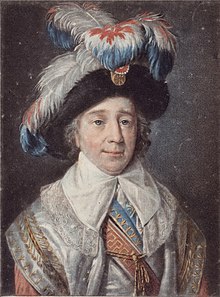Paul Barras
|
Viscount of Barras Paul François Jean Nicolas |
|
|---|---|
 |
|
| Director of the French Directory | |
|
In office 5 October 1795 – 10 November 1799 |
|
| Preceded by |
Office created (Preceded by the President of the Committee of Public Safety De Cambacérès) |
| Succeeded by |
Office abolished (Succeeded by the First Consul Napoleon Bonaparte) |
| 61st President of the National Convention | |
|
In office 4 February 1795 – 19 February 1795 |
|
| Preceded by | Stanislas Joseph François Xavier Rovère |
| Succeeded by | François Louis Bourdon |
| Member of the National Convention | |
| Constituency | Var |
|
In office 20 September 1792 – 10 November 1799 |
|
| Personal details | |
| Born |
30 June 1755 Fox-Amphoux, France |
| Died | 29 January 1829 (aged 73) Chaillot (present-day Paris), France |
| Political party |
The Mountain (1792–1794) Thermidorian (1794–1799) |
| Spouse(s) | Unknown wife (left) |
| Domestic partner |
Sophie Arnould, Thérésa Tallien, Joséphine de Beauharnais |
| Profession | Military officer |
| Religion | Catholic Church (baptized) |
| Military service | |
| Allegiance |
|
| Service/branch |
|
| Years of service | 1771–1783 |
| Rank | Captain |
| Unit | Régiment Royal Roussillon |
| Battles/wars | |
Paul François Jean Nicolas, vicomte de Barras (30 June 1755 – 29 January 1829), commonly known as Paul Barras, was a French politician of the French Revolution, and the main executive leader of the Directory regime of 1795–1799.
Descended from a noble family of Provence, he was born at Fox-Amphoux, in today's Var département. At the age of sixteen, he entered the regiment of Languedoc as a "gentleman cadet". In 1776, he embarked for French India.
Shipwrecked on his voyage, he still managed to reach Pondicherry in time to contribute to the defence of that city during the Second Anglo-Mysore War. Besieged by British forces, the city surrendered on 18 October 1778; after the French garrison was released, Barras returned to France. He took part in a second expedition to the region in 1782/83, serving in the fleet of the renowned Admiral Pierre André de Suffren. Afterwards, he spent several years back home in France at leisure in relative obscurity.
At the outbreak of the Revolution in 1789, he advocated the democratic cause, and became one of the administrators of the Var. In June 1792 he took his seat in the high national court at Orléans. Later in that year, on the outbreak of the French Revolutionary Wars, Barras became commissioner to the French Army, which was facing the forces of Sardinia in the Italian Peninsula, and entered the National Convention as a deputy for the Var.
...
Wikipedia
